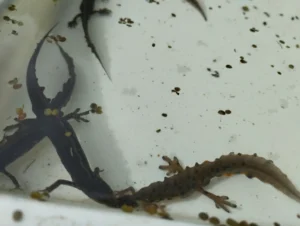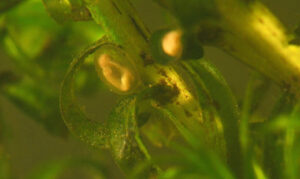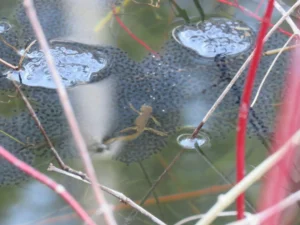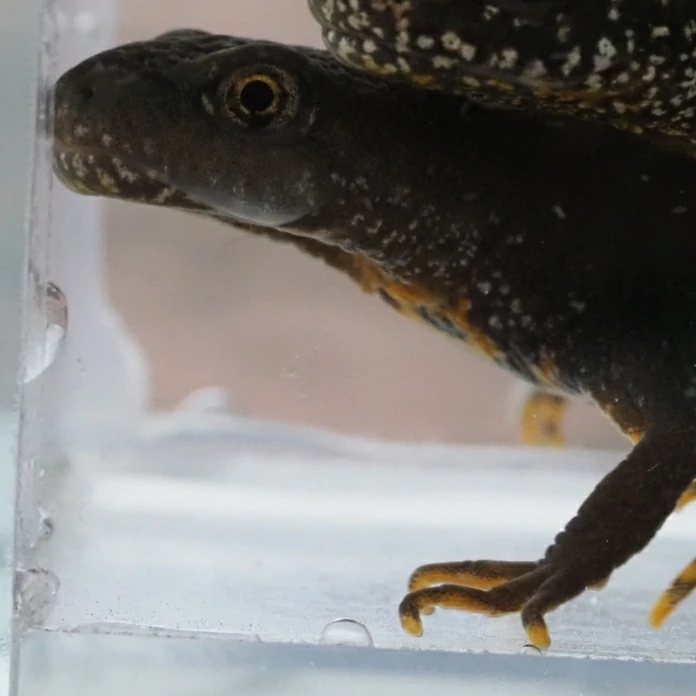You’re standing by a quiet forest pond in early spring. The water is still, showing soft green from the trees around it. Tiny ripples spread as newts glide silently beneath, looking for mates. You might wonder: after all that effort, do newts die once mating is over?
Newts don’t die after mating. Unlike some insects or fish that die right after reproducing, newts survive and keep living. Mating is just one part of their life, not the last thing they do.
How Newts Mate
Newts have a delicate and interesting mating ritual. In many species, the male performs a little dance, waving his tail to show off bright colors and release chemicals, called pheromones, into the water.

The female watches closely. If she’s interested, the male leaves a small sperm packet (called a spermatophore) on the ground or plants.
She picks it up with her cloaca (a tiny opening she has for both eggs and waste) and this fertilizes her eggs inside.
Newts don’t mate like mammals. The process is slow, quiet, and needs patience.
Mating can last for hours, and during this time, both newts have to stay alert to predators and other dangers in their environment.
Why People Think Newts Might Die After Mating
Some animals do die after breeding, like certain salmon or insects. Seeing animals put so much energy into mating can make it look like newts might die too.
Male newts spend a lot of energy on their dances, and females spend energy carrying and fertilizing eggs. After this, they might look tired or move slower.
But exhaustion is temporary, not deadly.
Both males and females survive breeding and go back to normal activity after a short rest.
What Newts Do After Mating
After mating, newts usually go back to their favorite hiding spots: moss, leaves, or shallow ponds. They may:
-
Rest and recover from using lots of energy.
-
Eat to get back the nutrients they lost.
-
Prepare for more mating if the season allows.
For females, the next big task is laying eggs. They place eggs in water on leaves, moss, or rocks, one at a time, to give each egg the best chance of survival.

Males might keep courting other females or protect a territory, depending on the species and how many other newts are around.
Newts Build Up Reserves Before Mating
Mating takes a lot of energy, but newts are ready for it. They store energy before breeding, usually as fat under the skin or in their muscles.
This stored energy helps them:
-
Do long courtship displays.
-
Survive days when they eat very little during mating.
-
Recover afterward without risking their lives.
Even after multiple breeding events in one season, healthy newts keep feeding, growing, and surviving for many years.
Does Mating Change How Long Newts Live?
Mating doesn’t make newts die sooner. Things like predators, bad water, disease, and lack of food are much bigger risks.
A well-fed, safe newt can live for several years, mating season after season.
In captivity, some newts live up to 20 years, still active long after many breeding cycles.
Differences Between Male and Female Newts
Both males and females survive mating, but they use energy differently:
-
Males: spend more energy on dances and courtship. After mating, they need to rest and hunt to get their strength back.
-
Females: invest in egg production, which needs lots of nutrients and careful planning for laying eggs. Recovery means getting back energy lost making and fertilizing eggs.

Even with these differences, neither males nor females die right after mating.
Can Stress Affect Newts After Mating?
While mating itself isn’t deadly, stress can affect survival. Predators, bad water, little food, or harsh conditions make newts more vulnerable after using a lot of energy mating.
For example, a female laying eggs in a pond with fish predators may have a higher chance of dying.
But that’s because of danger in the environment, not because mating kills her.
Watching Newts Mate in Captivity
In tanks, mating is interesting to watch. Newts show courtship behaviors, deposit spermatophores, and then retreat to safe hiding spots.
Pet owners sometimes worry that newts might die after breeding because they look tired.
With proper care, feeding, and habitat, newts recover fully and continue normal behavior.
Conclusion
Newts don’t die after mating. Unlike some insects or fish that have one last reproductive act, newts keep living after breeding, feeding, hiding, and eventually getting ready for the next season.
Mating is energy-heavy, interesting, and sometimes exhausting, but it’s only a part of their life story.
Their survival depends on stored energy, good conditions, and careful management of their small but demanding lives.
Watching newts during and after mating shows resilience, patience, and ways they survive year after year.
Every courtship, every egg laid, is a step in a life designed to keep going, under moss, leaves, and quiet forest floors.
Hi, my name is Ezra Mushala, i have been interested animals all my life. I am the main author and editor here at snakeinformer.com.

